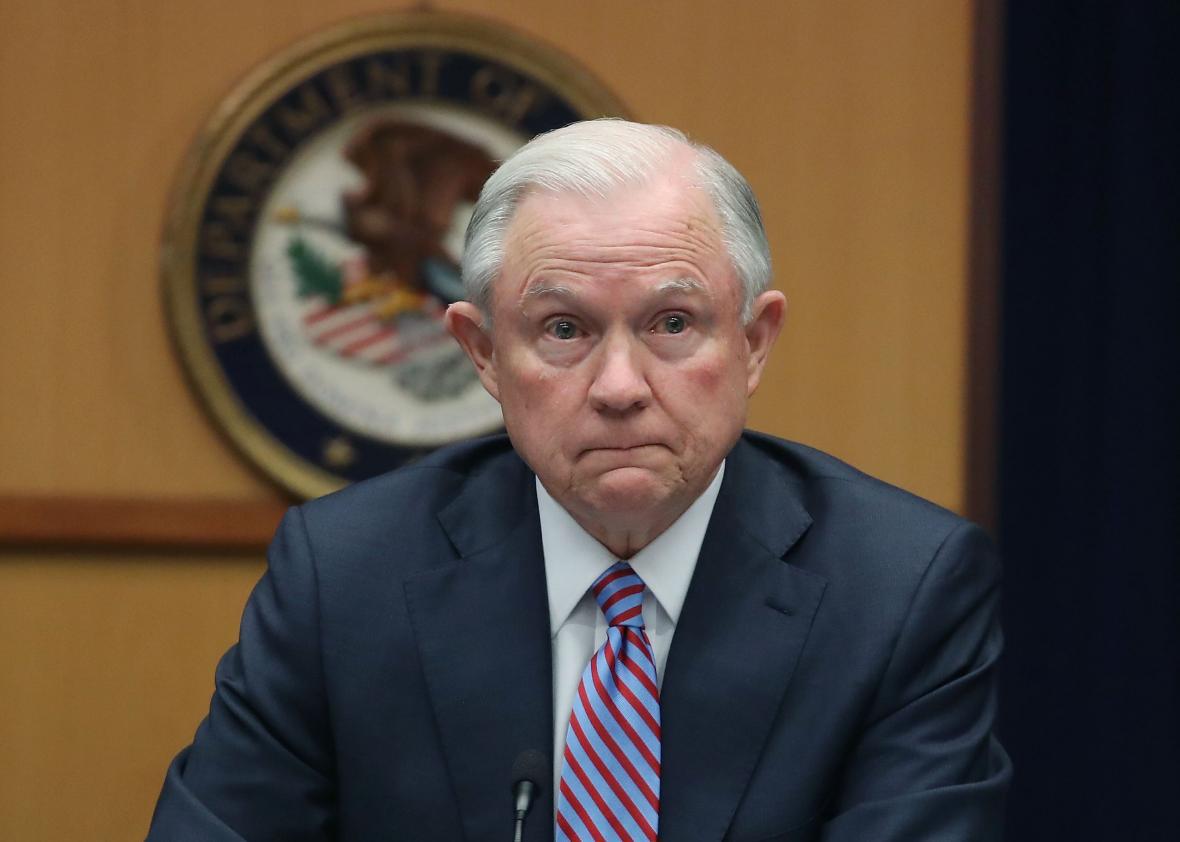U.S. Attorney General Jeff Sessions, a man once deemed too racist to become a federal judge in Alabama by Senate Republicans, told talk radio host Mark Levin on Tuesday evening that a federal judge in Hawaii had no right to enjoin a presidential executive order on immigration. Apparently his state is not sovereign but “so-called.”
The interview, which CNN picked up, was about President Trump’s upcoming federal judicial picks. Sessions explained to Levin that “our president, having seen some of these weird interpretations of the executive order that he put out, I think he’s more understanding now that we need judges who follow the law.” Sessions went on to say that “this is a huge matter. I really am amazed that a judge sitting on an island in the Pacific can issue an order that stops the president of the United States from what appears to be clearly his statutory and constitutional power.”
To put that another way, not only is Hawaii not an actual state, according to the chief law enforcement officer of the United States, but Judge Derrick Watson, the federal judge from Hawaii who put his travel ban on hold, is not an actual federal judge. The soft bigotry of soft bigotry marches ever onward.
Perhaps this shouldn’t surprise us. Remember when Trump almost managed to derail his candidacy as the most racist presidential aspirant in history by calling an American-born judge of Mexican heritage a “hater” and a “Mexican” unfit by race to oversee his Trump University lawsuit? Remember when candidate Trump warned that “They ought to look into Judge Curiel,” and Paul Ryan called this the “textbook definition of racist comments”? (Curiel, by the way, will now oversee the appeal over the first deportation of a Deferred Action for Childhood Arrivals–protected “Dreamer” deported to Mexico. The case, which was randomly assigned to Curiel, comes after Trump and Homeland Security Secretary John Kelly promised that the administration would not deport anyone with an active DACA status.)
Remember when Trump called the Seattle Republican appointee who upheld an injunction on his first attempt at an immigration ban a “so-called judge”? Remember when that judge needed increased security detail to protect him against the death threats?
When the president does it, it’s appalling. But when the chief law enforcement officer repeats slanders about members of a diverse and fragile federal judiciary, it is beyond belief. The same man who so cheerfully read It’s Not Easy Being a Bunny at the Easter Egg Roll apparently thinks it’s challenging to be America’s lawyer. In his interview with Levin, he also tossed in a partisan slander of the 9th U.S. Circuit Court of Appeals to go with his suggestion that Trump’s America has “real” states and lesser states that lurk foreignly on islands in the Pacific. This isn’t just shooting your mouth off on the stump—this is the nation’s top lawyer completely misapprehending what judges do and what states are. There is a long, overtly racist history of discrediting the legitimacy of Hawaii’s statehood that Sessions has just tapped into, and there is a burgeoning and overtly racist and geographic move toward discrediting the legitimacy of federal judges. Good thing the attorney general doesn’t have to deal with the courts and the law in his new job.
Sen. Mazie Hirono, who serves on the Senate Judiciary Committee, quickly made that point this afternoon when she tweeted out:
Hawaii’s other senator, Brian Schatz, went one further, tweeting:
Nobody doubts for even one second that it’s 1959 every single day in Sessions’ brain. We were warned. Still, we persisted. But it’s hard to think he wasn’t fully aware of the grievous insult he was hurling at the federal judicial branch this week. Remember back when it seemed like maligning a federal jurist for his geographic origin would be disqualifying for a presidential nominee? We were wrong about that. And apparently now it’s what we ought to expect from the nation’s top lawyer.
